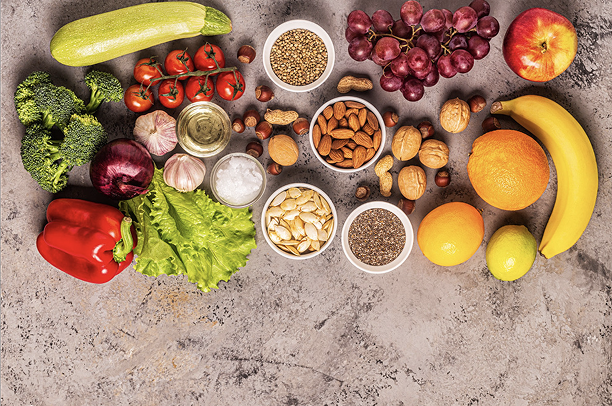This fertility diet combines Traditional Chinese Medicine (TCM) principles with functional medicine strategies to optimize fertility by addressing root causes, reducing inflammation, and improving overall health.

Kidney Qi Flow
The Kidney system forms the foundation of reproductive health in Traditional Chinese Medicine (TCM). It governs the essence that is essential for fertility, growth, hormonal balance (including low AMH and high FSH), and enhancing egg quality. To nourish the Kidneys, prioritize foods that are deeply nourishing and restorative:
Nourishing Foods: Black sesame seeds, walnuts, black beans, kidney beans, seaweed, lamb, duck and bone broth.
Warming Options: Include cinnamon, ginger, garlic, and clove in your meals to gently warm the body.
Cooking Methods: Opt for slow-cooked dishes like soups, stews, and congee to build warmth and energy.
Avoid overconsumption of cold or raw foods (e.g., salads, smoothies, iced drinks), as they deplete Kidney Yang and can create cold conditions in the uterus. Also avoid foods directly from the fridge and choose to consume at room temperature. Warm herbal teas (like ginger tea) are a great alternative for hydration. Whenever possible, choose organic foods to avoid toxins, pesticides, and added hormones that can disrupt hormonal balance and impact fertility.

Liver Qi Flow
The Liver plays a crucial role in regulating the smooth flow of Qi and blood, which is essential for ovulation and maintaining a healthy menstrual cycle. Foods that soothe and detoxify the Liver are key:
Liver-Nourishing Foods: Dark leafy greens (kale, spinach, arugula), beets, carrots, broccoli, cauliflower, and celery.
Detoxifying Herbs: Incorporate dandelion tea, burdock root, or chamomile tea.
Anti-Inflammatory Spices: Use turmeric and ginger to reduce inflammation and support detoxification.
To support healthy Liver Qi flow, limit or avoid excessive alcohol, caffeine, processed foods, and fried or oily meals, as they can stagnate the Liver. Opt for organic produce whenever possible to reduce exposure to harmful chemicals that can burden the Liver and disrupt its detoxification processes.
Spleen Qi Strength
The Spleen governs digestion and energy production, both of which are critical for fertility. A strong Spleen ensures the body has the Qi needed to nourish the reproductive system and maintain a healthy hormonal balance.
Easily Digestible Foods: Warm cooked grains like millet, quinoa, rice, and oats; root vegetables like sweet potatoes, carrots, and parsnips.
Energizing Snacks: Roasted chickpeas, pumpkin seeds, and lightly toasted sunflower seeds.
Soothing Soups: Chicken soup with ginger and vegetables, congee with goji berries and dates.
Avoid heavy, greasy, or damp-forming foods (e.g., fried foods, dairy in excess, sugary treats), as they burden the Spleen and lead to dampness which severely impacts fertility. Warm, balanced meals will help maintain digestive health. Choosing organic foods is especially important to support the Spleen and avoid introducing unnecessary toxins that can create dampness and affect fertility.
Blood Nourishment
Fertility depends on rich, healthy blood to nourish the uterus and support implantation. A diet rich in blood-nourishing foods is essential for building and maintaining robust blood supply:
Iron-Rich Foods: Spinach, kale, beets, and red meat (grass-fed, in moderation).
Nutrient-Dense Choices: Goji berries, dates, blackberries, raspberries, figs, and eggs.
Supplements from Nature: Add sesame seeds and molasses to meals for extra nutrients.
Warming Proteins: Consider bone broth, chicken, duck, and fish like salmon, which is rich in omega-3 fatty acids to support blood health.
Incorporate these foods into your diet while avoiding cold and raw items especially during menstruation, as these can slow blood flow and create stagnation. Whenever possible, select organic options to ensure your body is nourished with clean, toxin-free ingredients, supporting healthy blood and overall fertility.
Core Principles
1. Warm and Nourishing Foods
• Focus on warm, cooked meals to support digestion and energy production (Qi).
• Avoid raw or cold foods and drinks that can impair digestion and lead to dampness.
2. Anti-Inflammatory Focus
• Chronic inflammation can hinder fertility. Avoid inflammatory foods like processed sugar, refined carbohydrates, and fried foods.
• Include anti-inflammatory, nutrient-dense options like omega-3 fatty acids, leafy greens, and berries.
3. Elimination Diet for Sensitivities
• Identify and eliminate common allergens like gluten, dairy, soy, corn, and processed sugar for 10 days. Gradually reintroduce them over 30 days to monitor reactions.
• Eliminating gluten and dairy for 60-90 days is beneficial for everyone, but it is especially important for women with diminished ovarian reserve or premature ovarian insufficiency, as it can help reduce inflammation and support overall reproductive health.
4. Stress and Adrenal Support
• High stress impacts adrenal health and fertility. Incorporate stress-reducing practices (meditation, yoga) and avoid over-exercising (avoid bootcamps and high intensity training).
• Caffeine reduction is key. Transition gradually from regular coffee to decaf, green tea, and eventually herbal teas.
5. Hydration
• Drink plenty of water to support detoxification and overall health during dietary changes. Ensure you are drinking room temperature or warm water throughout the day.

90-Day Fertility Meal Planner
Want a more personalized detailed day by day meal planner for our protocol?

Consistency with the protocol is key to your fertility journey, and pairing it with the right diet can enhance results and optimize reproductive health. The foods you eat play a crucial role in balancing hormones, nourishing your body, and creating the ideal environment for conception.
While it's important to avoid certain foods that can hinder progress, focus on nutrient-rich, fertility-enhancing options. Perfection isn't required—follow the 80/20 rule: make healthy choices 80% of the time while allowing some flexibility the other 20%. This balance is sustainable, reduces stress, and still supports your long-term goals.
The table below provides a quick summary of foods to include in your diet and those to avoid when possible. It is intended as a guide with examples rather than a comprehensive list. Remember, every small step toward better nutrition contributes to creating the best possible environment for your fertility journey.
Organic, hormone-free options: chicken, turkey, lamb, duck, eggs, fish (wild-caught salmon, sardines, mackerel), grass-fed beef.
Plant-based proteins: lentils, black beans, kidney beans, chickpeas, tofu (non-GMO, organic, in moderation), tempeh.
Dark leafy greens: spinach, kale, Swiss chard, mustard greens, dandelion greens, bok choy, collard greens.
Liver-supportive vegetables: carrots, beets, celery, artichokes, asparagus, fennel, cucumbers, radishes.
Anti-inflammatory vegetables: mushrooms, zucchini, squash, sweet potatoes, parsnips, turnips.
Cruciferous vegetables: broccoli, Brussels sprouts, cauliflower.
Other vegetables: leeks, onions, garlic, cabbages.
Avocado, nuts (walnuts, almonds, cashews, macadamia nuts), seeds (black sesame, chia, flaxseeds, sunflower, pumpkin), olive oil, ghee, coconut oil.
Antioxidant-rich options: goji berries, dates, blackberries, raspberries, cherries, apples, pomegranate, oranges.
Additional choices: figs, pears, blueberries, cranberries, peaches, nectarines, kiwis.
Avoid excessive tropical fruits (pineapple, mango) or high-sugar fruits (grapes, bananas) if blood sugar is a concern. Always choose organic when possible.
Easily digestible grains: quinoa, millet, oats, brown rice, barley, buckwheat, amaranth, teff.
Gluten-free options: sorghum, wild rice, quinoa.
Kelp, seaweed (nori, wakame, kombu, dulse) and spirulina.
Anti-inflammatory and warming: ginger, turmeric, cinnamon, garlic, cardamom, star anise, clove, fennel, cumin.
Warm herbal teas: ginger tea, chamomile tea, dandelion tea, peppermint tea, lemon balm tea, nettle leaf tea.
Bone broth: beef or chicken, slow-cooked with herbs like parsley and thyme.
Room-temperature lemon water with honey.
Energy-boosting snacks: roasted chickpeas, spiced nuts (cinnamon and honey almonds), trail mix with goji berries and pumpkin seeds.
Warming options: baked sweet potato wedges, apple slices with almond butter, oatmeal with molasses and berries.
Recommended foods to avoid to optimize fertility
Refined sugars and simple carbohydrates: white bread, pastries, cookies, cakes, candy, sugary cereals, and sweetened beverages.
Packaged snacks, chips, frozen meals, fast food, fried items like French fries, doughnuts, and battered meats.
Milk, cheese, ice cream, and yogurt (especially non-organic, which may contain added hormones).
Foods containing wheat, barley, rye, and processed products like pasta, bread, and crackers (especially if non-organic).
Salads, raw vegetables, cold smoothies, ice cream, and chilled drinks (as they can weaken the Spleen and create internal cold).
Beer, wine, spirits, and other alcoholic beverages.
Coffee, energy drinks, and excessive amounts of tea or soda (opt for herbal teas instead).
Artificial sweeteners, preservatives, flavorings, and food dyes found in many processed and packaged foods.
Supplements and Project: Life Herbal Support
1. Project: Life Herbal Formulations:
Our formulations are tailored to individual needs, balancing hormones, enhancing blood circulation, and restoring Qi. Daily herbal formulations from Project: Life complement this plan by improving digestion, clearing stagnation, and reducing stress.
2. Vitamin D3:
Ensure your levels are in the optimal range of >100ng/mL. If they are low, supplement with high-dose Vitamin D3 (5,000 - 10,000iu daily) under medical supervision.
3. Probiotics and Gut Support:
Address gut imbalances that may affect fertility through high-quality probiotics and gut health protocols.
Lifestyle Recommendations
1. Track Progress:
Keep a food and symptom diary to monitor dietary changes and reactions. Use tools like continuous glucose monitors (CGMs) for personalized blood sugar management.
2. Stress Reduction:
Prioritize relaxation techniques like acupuncture, yoga, or mindfulness to support adrenal and hormonal health. Aim for 8 to 10 hours of uninterrupted sleep daily.
3. Partner Health:
Encourage your partner to participate in the diet guidelines and undergo semen analysis for a holistic approach to fertility. Incorporate our Project: Life male formulations if necessary.

Your fertility journey is a deeply personal and transformative process, and we're honored to support you every step of the way.
While our Project: Life formulations are designed to do much of the heavy lifting by balancing hormones, improving blood circulation, and restoring Qi, diet remains a critical piece of the fertility puzzle. Clients who adhere to these dietary principles as closely as possible often see supercharged results, amplifying the benefits of the formulations and optimizing their reproductive health. Remember, every positive choice you make—no matter how small—contributes to your overall health and fertility.
If you have any questions or need further guidance, please don't hesitate to reach out to us at support@getprojectlife.com. We're always here to help, support, and cheer you on as you work toward your goals.
With warmth and encouragement,
The Project Life Team

90-Day Fertility Meal Planner
Want a more personalized detailed day by day meal planner for our protocol?


